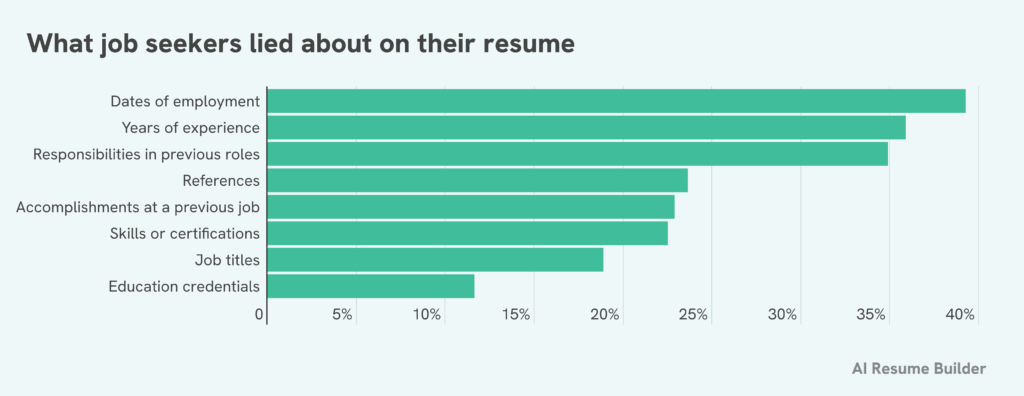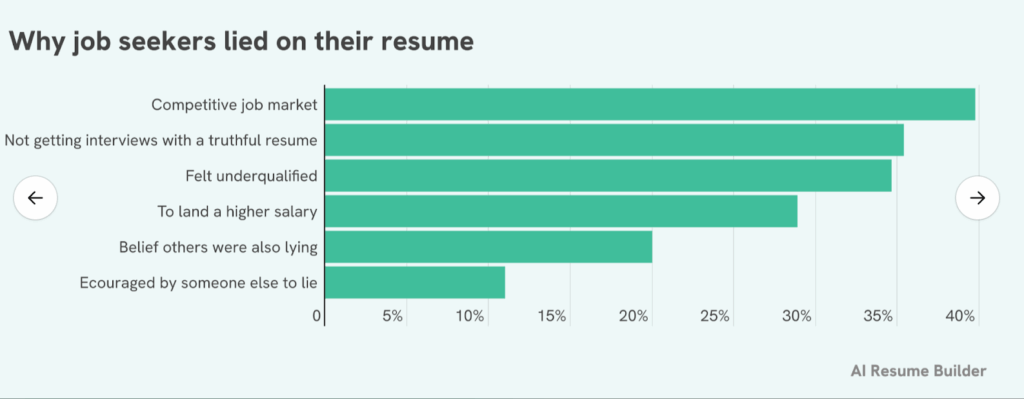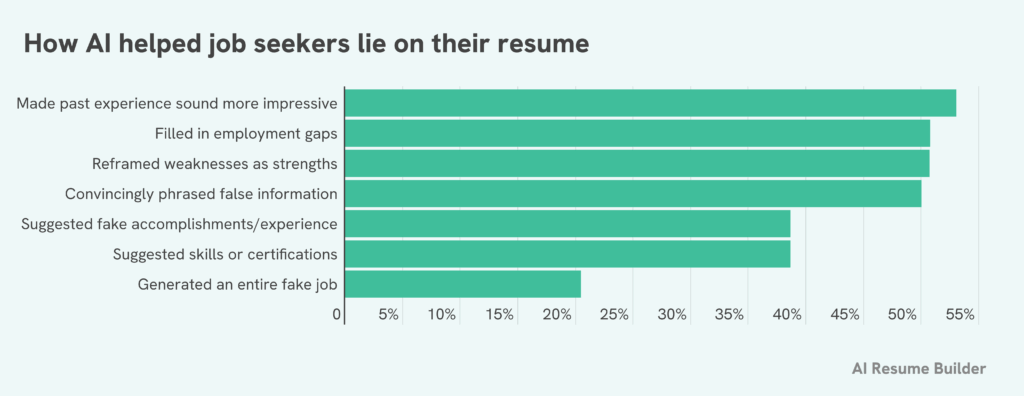A new AI Resume Builder survey of 7,884 U.S. adults reveals that 10% of job seekers have lied on their resume, and many relied on AI tools like ChatGPT to do so.
Key findings:
- 10% of job seekers admit to lying on their resume, often about dates of employment, experience, and responsibilities
- Gen Zers and men are more likely to lie than their counterparts
- 31% of resume liars used AI tools like ChatGPT to help craft or enhance their lies; nearly half of Gen Zers used AI
- Top reasons for lying include a competitive job market, lack of interview offers, and feeling underqualified
- 76% of those who lied received a job offer, and 81% say the lie helped them get it
- 90% of those who use AI at work say it makes them more confident stretching the truth on job applications, knowing AI can help them fake it after they’re hired
Gen Zers Most Likely To Lie on Their Resume
Overall, 10% of job seekers say they’ve lied on their resume. Gen Z job seekers are the most likely generation to lie on their resumes, with 20% admitting to it, compared to 13% of Millennials, 8% of Gen X, and just 4% of Baby Boomers.
Men are nearly twice as likely to lie on their resumes, with 12% admitting to it compared to just 7% of women.

“Candidates lie on their resume when they feel stressed about their search,” says Soozy Miller, head of career advising at AI Resume Builder. “With recent layoffs, many people are out of work and worried about the job market. Job seekers feel that the job market is so tough right now that actions such as lying on a resume to get a job are justified.”
Common Lies Include Years of Experience and Responsibilities
Among the respondents who admit to lying on their resume, the most common fabrications are dates of employment (39%), years of experience (36%), and responsibilities in previous roles (35%).
Other frequently misrepresented areas include references (24%), accomplishments at a previous job (23%), and skills or certifications (23%). Job seekers also lie about job titles (19%) and education credentials, such as degrees, schools, or GPA (12%).

Competitive Job Market Tops Reasons for Lying
Respondents cite a range of motivations for lying on their resume. Four in ten (40%) say they did so because the job market felt too competitive, while 35% report they weren’t getting interviews with a truthful resume, and a similar share (35%) say they felt underqualified.
Additionally, 29% lied to increase their chances of securing a higher salary. Some respondents (20%) admit they were influenced by the belief that others were also lying, while 11% say they were encouraged by someone else.

1 in 5 Resume Liars Used AI To Deceive Hiring Managers
Among respondents who admitted to lying on their resume, 31% say they used an AI tool such as ChatGPT to help write it. Gen Zers and Millennials were far more likely to leverage AI, with 46% and 38% saying they did respectively.
More than half of AI users (54%) used the tool specifically to help them lie — meaning roughly 17% of all resume liars used AI to fabricate or embellish information.
The tool helped users rewrite their experience to sound more impressive (53%), reframe gaps or weaknesses as strengths (51%), and phrase false information in a more professional or convincing way (50%). AI also assisted liars in suggesting fake accomplishments or experience (39%), including skills or certifications they didn’t have (39%), and even generating a completely fake job or position (20%).

Here are some of the prompts job seekers gave to AI tools, such as ChatGPT, to help them lie:
- “Help me create fake experience for a job I never had.”
- “You are my resume writer. I am not qualified for the job I need. It is your job to spin my qualifications to make me more desirable to hiring managers.”
- “Tailor my resume to fit job position requirements.”
- “How do I sound more impressive on my resume than I actually am?”
- “Enhance my resume to make it seem like I accomplished more than I actually accomplished.”
- “How would you make these skills more interesting to an employer? How would you fill in these time gaps so I look professional?”
“While AI tools can make the job seeker look better by preventing errors like grammar and spelling mistakes on their resume, it can also help job seekers lie,” says Miller. “If the job seeker tells AI they increased sales by 30%, even if that’s not true, AI will simply add it to the resume in a well-written statement.”
AI is making job seekers more comfortable with lying
Among those who admitted to lying on their resume, 43% say they use AI tools to complete work-related tasks. Of this AI-proficient group, 90% say AI skills make them more confident applying to jobs they aren’t fully qualified for. Specifically, 34% feel “a lot” more confident, while 56% feel “a little bit” more confident.
This suggests AI is emboldening them to stretch the truth on their qualifications because they trust that AI will help them perform once they’re hired.
3 in 4 Resume Liars Got a Job Offer
More than three-quarters (76%) of resume liars say they received a job offer. Of those, 94% accepted the offer, and 88% report being satisfied with the compensation.
When asked if the lie helped them secure the job, 81% believe it did. While resume fraud carries risks, only 8% think anyone discovered the deception, and the vast majority (92%) say, to their knowledge, their lies were never detected. Additionally, only 21% regret lying on their resume.
“Any time you lie on your resume, it’s a risk,” says Miller. “If your lie is discovered, you may be labeled by a company as untrustworthy, and will be difficult to reapply. Similarly, recruiters who discover your lie might warn their associates to avoid you. Something else to consider is if you lie your way into a job you’re underqualified for, it’s possible you won’t be successful in the job.
Methodology
This survey launched in May 2025. It was commissioned by AIResumeBuilder.com and conducted online by the polling platform Pollfish. Overall, 7,884 U.S. adults were surveyed. Appropriate respondents were found via demographic criteria and screening questions.
